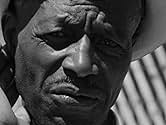Son House(1902-1988)
- Music Department
- Soundtrack
Legendary bluesman and one of the originators of the Mississippi Delta blues style, Son House was born Eddie Jones Jr. in 1902 in Riverton, MS, a small impoverished town in the Mississippi Delta. He sang in his local Baptist church as a youth and actually became a preacher at 20 years of age. His affinity for women and alcohol, however, interfered with his pastoral duties and he eventually decided that the secular world was more to his liking. He also discovered the blues while living in Louisiana in the early 1920s, and when he returned to Mississippi in 1926 he learned how to play the guitar. He worked the Delta juke joint and house party scene for the next few years. In 1928 he got into an altercation with another man and shot and killed him. Although he claimed self-defense, he was tried for the killing and sent to prison. However, a year later a judge re-examined the case and decided that House did indeed act in self-defense and ordered his release.
After getting out of prison he traveled to Lula, MS, where he ran into bluesmen Charley Patton and Willie Brown. The three teamed up and traveled and played together. In 1930 they recorded some sides for Paramount Records. One of the songs House recorded, "Preachin' the Blues", was about his leaving the church to play the blues. The three continued to perform together until Patton's death in 1934. House and Brown still played together on occasion after that, but both also went solo on occasion.
In 1942 record producer Alan Lomax recorded House in Washington, DC, for the Library of Congress, and the next year he traveled to Mississippi to record House again. In 1943 House moved to Rochester, NY, and abruptly left the music business. He surfaced again in 1964 when young white folk-music aficionados discovered his music and urged him to return to performing, which he eventually did. He performed at the 1964 Newport Folk Festivalm, played New York's Carnegie Hall and signed a contract with CBS Records. His album for that label, "Father of the Folk Blues", was a major critical and financial success and led to House's further appearances at folk and blues festivals in both the US and Europe. In 1969 he was the subject of a documentary film, "Son House".
House's health began to have serious health problems in 1971, and although he did perform occasionally over the next few years, his ill health pretty much ended his career. In 1976 he moved to Detroit, MI, and in 1980 he was inducted into the Blues Foundation's Hall of Fame in 1983.
He died in Detroit of Alzheimers Disease in 1988.
After getting out of prison he traveled to Lula, MS, where he ran into bluesmen Charley Patton and Willie Brown. The three teamed up and traveled and played together. In 1930 they recorded some sides for Paramount Records. One of the songs House recorded, "Preachin' the Blues", was about his leaving the church to play the blues. The three continued to perform together until Patton's death in 1934. House and Brown still played together on occasion after that, but both also went solo on occasion.
In 1942 record producer Alan Lomax recorded House in Washington, DC, for the Library of Congress, and the next year he traveled to Mississippi to record House again. In 1943 House moved to Rochester, NY, and abruptly left the music business. He surfaced again in 1964 when young white folk-music aficionados discovered his music and urged him to return to performing, which he eventually did. He performed at the 1964 Newport Folk Festivalm, played New York's Carnegie Hall and signed a contract with CBS Records. His album for that label, "Father of the Folk Blues", was a major critical and financial success and led to House's further appearances at folk and blues festivals in both the US and Europe. In 1969 he was the subject of a documentary film, "Son House".
House's health began to have serious health problems in 1971, and although he did perform occasionally over the next few years, his ill health pretty much ended his career. In 1976 he moved to Detroit, MI, and in 1980 he was inducted into the Blues Foundation's Hall of Fame in 1983.
He died in Detroit of Alzheimers Disease in 1988.



















